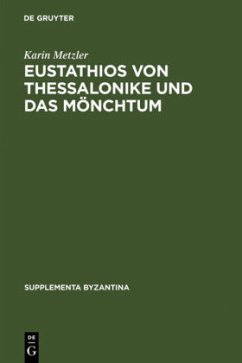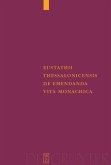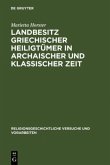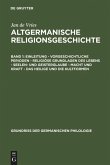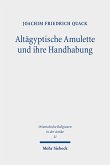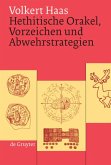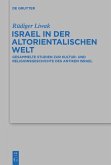This analytical volume examines the various aspects of "De emendanda vita monachica", combining this with the question of whether this text by Eusthatios of Thessalonica with its polemical fireworks and learned allusions was really intended for the monks of the diocese, who are portrayed as being uneducated, or was actually aimed at an unnamed readership. This question forms a leitmotif through the various chapters of the study in which the author locates the work historically within Eustathios' biography and the context of contemporary monastic life, analyzes its place in literary history together with the linguistic devices deployed to establish the different stylistic levels and to influence the psychology of the readers and paints in the theological and hermeneutic background. A detailed commentary is appended.
This volume compliments the edition published in the series "Corpus Fontium Historiae Byzantinae". Both volumes are available as a set .
War die Schrift "De emendanda vita monachica" des Eustathios von Thessalonike mit ihrem Feuerwerk an Polemik und gelehrten Anspielungen tatsächlich für die als ungebildet dargestellten Mönche der Diözese bestimmt - oder für ein nicht angesprochenes Publikum? Diese Leitfrage zieht sich durch die ausführliche Einführung und den detaillierten Stellenkommentar, die Karin Metzler gleichzeitig mit ihrer Neuedition des Textes in den CFHB vorlegt. Sie untersucht darin historisch den Ort des Werkes innerhalb der Biographie des Eustathios und vor der Folie des zeitgenössischen Mönchtums, bestimmt seine Stellung in der Literaturgeschichte, analysiert die sprachlichen Mittel zur Gestaltung der Stilebenen sowie die psychologische Lenkung der Rezipienten und zeigt den theologischen und hermeneutischen Hintergrund auf.
Dieser Band ergänzt die Edition in der Reihe "Corpus Fontium Historiae Byzantinae". Beide Bände sind auch zu einem gemeinsamen Setpreis erhältlich.
This volume compliments the edition published in the series "Corpus Fontium Historiae Byzantinae". Both volumes are available as a set .
War die Schrift "De emendanda vita monachica" des Eustathios von Thessalonike mit ihrem Feuerwerk an Polemik und gelehrten Anspielungen tatsächlich für die als ungebildet dargestellten Mönche der Diözese bestimmt - oder für ein nicht angesprochenes Publikum? Diese Leitfrage zieht sich durch die ausführliche Einführung und den detaillierten Stellenkommentar, die Karin Metzler gleichzeitig mit ihrer Neuedition des Textes in den CFHB vorlegt. Sie untersucht darin historisch den Ort des Werkes innerhalb der Biographie des Eustathios und vor der Folie des zeitgenössischen Mönchtums, bestimmt seine Stellung in der Literaturgeschichte, analysiert die sprachlichen Mittel zur Gestaltung der Stilebenen sowie die psychologische Lenkung der Rezipienten und zeigt den theologischen und hermeneutischen Hintergrund auf.
Dieser Band ergänzt die Edition in der Reihe "Corpus Fontium Historiae Byzantinae". Beide Bände sind auch zu einem gemeinsamen Setpreis erhältlich.
"Mit den beiden Bänden hat M. nicht nur einen entscheidenden, zukunftsweisenden Beitrag zu Person und Werk eines der größten Gelehrten der byzantinischen Welt geleistet, sondern in gewissem Sinn auch ein Handbuch zum (nicht:des) byzantinischen Mönchtum geschaffen, vorbildhaft in philologischer und literarischer Akribie."
Peter Schreiner in: Theologische Literaturzeitung 9/2009
Peter Schreiner in: Theologische Literaturzeitung 9/2009

